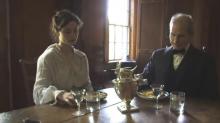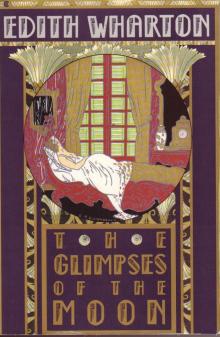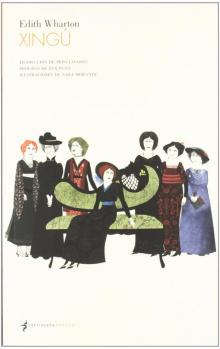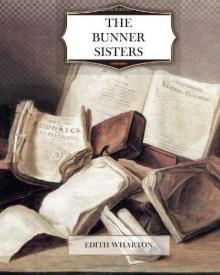- Home
- Edith Wharton
The Bunner Sisters Page 2
The Bunner Sisters Read online
Page 2
The seed sown by these long hours of meditation germinated at last in the secret wish to go to market some morning in Evelina’s stead. As this purpose rose to the surface of Ann Eliza’s thoughts she shrank back shyly from its contemplation. A plan so steeped in duplicity had never before taken shape in her crystalline soul. How was it possible for her to consider such a step? And, besides, (she did not possess sufficient logic to mark the downward trend of this “besides”), what excuse could she make that would not excite her sister’s curiosity? From this second query it was an easy descent to the third: how soon could she manage to go?
It was Evelina herself, who furnished the necessary pretext by awaking with a sore throat on the day when she usually went to market. It was a Saturday, and as they always had their bit of steak on Sunday the expedition could not be postponed, and it seemed natural that Ann Eliza, as she tied an old stocking around Evelina’s throat, should announce her intention of stepping round to the butcher’s.
“Oh, Ann Eliza, they’ll cheat you so,” her sister wailed.
Ann Eliza brushed aside the imputation with a smile, and a few minutes later, having set the room to rights, and cast a last glance at the shop, she was tying on her bonnet with fumbling haste.
The morning was damp and cold, with a sky full of sulky clouds that would not make room for the sun, but as yet dropped only an occasional snow-flake. In the early light the street looked its meanest and most neglected; but to Ann Eliza, never greatly troubled by any untidiness for which she was not responsible, it seemed to wear a singularly friendly aspect.
A few minutes’ walk brought her to the market where Evelina made her purchases, and where, if he had any sense of topographical fitness, Mr. Ramy must also deal.
Ann Eliza, making her way through the outskirts of potato-barrels and flabby fish, found no one in the shop but the gory-aproned butcher who stood in the background cutting chops.
As she approached him across the tesselation of fish-scales, blood and saw-dust, he laid aside his cleaver and not unsympathetically asked: “Sister sick?”
“Oh, not very—jest a cold,” she answered, as guiltily as if Evelina’s illness had been feigned. “We want a steak as usual, please—and my sister said you was to be sure to give me jest as good a cut as if it was her,” she added with child-like candour.
“Oh, that’s all right.” The butcher picked up his weapon with a grin. “Your sister knows a cut as well as any of us,” he remarked.
In another moment, Ann Eliza reflected, the steak would be cut and wrapped up, and no choice left her but to turn her disappointed steps toward home. She was too shy to try to delay the butcher by such conversational arts as she possessed, but the approach of a deaf old lady in an antiquated bonnet and mantle gave her her opportunity.
“Wait on her first, please,” Ann Eliza whispered. “I ain’t in any hurry.”
The butcher advanced to his new customer, and Ann Eliza, palpitating in the back of the shop, saw that the old lady’s hesitations between liver and pork chops were likely to be indefinitely prolonged. They were still unresolved when she was interrupted by the entrance of a blowsy Irish girl with a basket on her arm. The newcomer caused a momentary diversion, and when she had departed the old lady, who was evidently as intolerant of interruption as a professional story-teller, insisted on returning to the beginning of her complicated order, and weighing anew, with an anxious appeal to the butcher’s arbitration, the relative advantages of pork and liver. But even her hesitations, and the intrusion on them of two or three other customers, were of no avail, for Mr. Ramy was not among those who entered the shop; and at last Ann Eliza, ashamed of staying longer, reluctantly claimed her steak, and walked home through the thickening snow.
Even to her simple judgment the vanity of her hopes was plain, and in the clear light that disappointment turns upon our actions she wondered how she could have been foolish enough to suppose that, even if Mr. Ramy DID go to that particular market, he would hit on the same day and hour as herself.
There followed a colourless week unmarked by farther incident. The old stocking cured Evelina’s throat, and Mrs. Hawkins dropped in once or twice to talk of her baby’s teeth; some new orders for pinking were received, and Evelina sold a bonnet to the lady with puffed sleeves. The lady with puffed sleeves—a resident of “the Square,” whose name they had never learned, because she always carried her own parcels home—was the most distinguished and interesting figure on their horizon. She was youngish, she was elegant (as the title they had given her implied), and she had a sweet sad smile about which they had woven many histories; but even the news of her return to town—it was her first apparition that year—failed to arouse Ann Eliza’s interest. All the small daily happenings which had once sufficed to fill the hours now appeared to her in their deadly insignificance; and for the first time in her long years of drudgery she rebelled at the dullness of her life. With Evelina such fits of discontent were habitual and openly proclaimed, and Ann Eliza still excused them as one of the prerogatives of youth. Besides, Evelina had not been intended by Providence to pine in such a narrow life: in the original plan of things, she had been meant to marry and have a baby, to wear silk on Sundays, and take a leading part in a Church circle. Hitherto opportunity had played her false; and for all her superior aspirations and carefully crimped hair she had remained as obscure and unsought as Ann Eliza. But the elder sister, who had long since accepted her own fate, had never accepted Evelina’s. Once a pleasant young man who taught in Sunday-school had paid the younger Miss Bunner a few shy visits. That was years since, and he had speedily vanished from their view. Whether he had carried with him any of Evelina’s illusions, Ann Eliza had never discovered; but his attentions had clad her sister in a halo of exquisite possibilities.
Ann Eliza, in those days, had never dreamed of allowing herself the luxury of self-pity: it seemed as much a personal right of Evelina’s as her elaborately crinkled hair. But now she began to transfer to herself a portion of the sympathy she had so long bestowed on Evelina. She had at last recognized her right to set up some lost opportunities of her own; and once that dangerous precedent established, they began to crowd upon her memory.
It was at this stage of Ann Eliza’s transformation that Evelina, looking up one evening from her work, said suddenly: “My! She’s stopped.”
Ann Eliza, raising her eyes from a brown merino seam, followed her sister’s glance across the room. It was a Monday, and they always wound the clock on Sundays.
“Are you sure you wound her yesterday, Evelina?”
“Jest as sure as I live. She must be broke. I’ll go and see.”
Evelina laid down the hat she was trimming, and took the clock from its shelf.
“There—I knew it! She’s wound jest as TIGHT—what you suppose’s happened to her, Ann Eliza?”
“I dunno, I’m sure,” said the elder sister, wiping her spectacles before proceeding to a close examination of the clock.
With anxiously bent heads the two women shook and turned it, as though they were trying to revive a living thing; but it remained unresponsive to their touch, and at length Evelina laid it down with a sigh.
“Seems like somethin’ DEAD, don’t it, Ann Eliza? How still the room is!”
“Yes, ain’t it?”
“Well, I’ll put her back where she belongs,” Evelina continued, in the tone of one about to perform the last offices for the departed. “And I guess,” she added, “you’ll have to step round to Mr. Ramy’s to-morrow, and see if he can fix her.”
Ann Eliza’s face burned. “I—yes, I guess I’ll have to,” she stammered, stooping to pick up a spool of cotton which had rolled to the floor. A sudden heart-throb stretched the seams of her flat alpaca bosom, and a pulse leapt to life in each of her temples.
That night, long after Evelina slept, Ann Eliza lay awake in the unfamiliar silence, more acutely conscious of the nearness of the crippled clock than when it had volubly told out the minutes. The next
morning she woke from a troubled dream of having carried it to Mr. Ramy’s, and found that he and his shop had vanished; and all through the day’s occupations the memory of this dream oppressed her.
It had been agreed that Ann Eliza should take the clock to be repaired as soon as they had dined; but while they were still at table a weak-eyed little girl in a black apron stabbed with innumerable pins burst in on them with the cry: “Oh, Miss Bunner, for mercy’s sake! Miss Mellins has been took again.”
Miss Mellins was the dress-maker upstairs, and the weak-eyed child one of her youthful apprentices.
Ann Eliza started from her seat. “I’ll come at once. Quick, Evelina, the cordial!”
By this euphemistic name the sisters designated a bottle of cherry brandy, the last of a dozen inherited from their grandmother, which they kept locked in their cupboard against such emergencies. A moment later, cordial in hand, Ann Eliza was hurrying upstairs behind the weak-eyed child.
Miss Mellins’ “turn” was sufficiently serious to detain Ann Eliza for nearly two hours, and dusk had fallen when she took up the depleted bottle of cordial and descended again to the shop. It was empty, as usual, and Evelina sat at her pinking-machine in the back room. Ann Eliza was still agitated by her efforts to restore the dress-maker, but in spite of her preoccupation she was struck, as soon as she entered, by the loud tick of the clock, which still stood on the shelf where she had left it.
“Why, she’s going!” she gasped, before Evelina could question her about Miss Mellins. “Did she start up again by herself?”
“Oh, no; but I couldn’t stand not knowing what time it was, I’ve got so accustomed to having her round; and just after you went upstairs Mrs. Hawkins dropped in, so I asked her to tend the store for a minute, and I clapped on my things and ran right round to Mr. Ramy’s. It turned out there wasn’t anything the matter with her—nothin’ on’y a speck of dust in the works—and he fixed her for me in a minute and I brought her right back. Ain’t it lovely to hear her going again? But tell me about Miss Mellins, quick!”
For a moment Ann Eliza found no words. Not till she learned that she had missed her chance did she understand how many hopes had hung upon it. Even now she did not know why she had wanted so much to see the clockmaker again.
“I s’pose it’s because nothing’s ever happened to me,” she thought, with a twinge of envy for the fate which gave Evelina every opportunity that came their way. “She had the Sunday-school teacher too,” Ann Eliza murmured to herself; but she was well-trained in the arts of renunciation, and after a scarcely perceptible pause she plunged into a detailed description of the dress-maker’s “turn.”
Evelina, when her curiosity was roused, was an insatiable questioner, and it was supper-time before she had come to the end of her enquiries about Miss Mellins; but when the two sisters had seated themselves at their evening meal Ann Eliza at last found a chance to say: “So she on’y had a speck of dust in her.”
Evelina understood at once that the reference was not to Miss Mellins. “Yes—at least he thinks so,” she answered, helping herself as a matter of course to the first cup of tea.
“On’y to think!” murmured Ann Eliza.
“But he isn’t SURE,” Evelina continued, absently pushing the teapot toward her sister. “It may be something wrong with the—I forget what he called it. Anyhow, he said he’d call round and see, day after to-morrow, after supper.”
“Who said?” gasped Ann Eliza.
“Why, Mr. Ramy, of course. I think he’s real nice, Ann Eliza. And I don’t believe he’s forty; but he DOES look sick. I guess he’s pretty lonesome, all by himself in that store. He as much as told me so, and somehow”—Evelina paused and bridled—“I kinder thought that maybe his saying he’d call round about the clock was on’y just an excuse. He said it just as I was going out of the store. What you think, Ann Eliza?”
“Oh, I don’t har’ly know.” To save herself, Ann Eliza could produce nothing warmer.
“Well, I don’t pretend to be smarter than other folks,” said Evelina, putting a conscious hand to her hair, “but I guess Mr. Herman Ramy wouldn’t be sorry to pass an evening here, ‘stead of spending it all alone in that poky little place of his.”
Her self-consciousness irritated Ann Eliza.
“I guess he’s got plenty of friends of his own,” she said, almost harshly.
“No, he ain’t, either. He’s got hardly any.”
“Did he tell you that too?” Even to her own ears there was a faint sneer in the interrogation.
“Yes, he did,” said Evelina, dropping her lids with a smile. “He seemed to be just crazy to talk to somebody—somebody agreeable, I mean. I think the man’s unhappy, Ann Eliza.”
“So do I,” broke from the elder sister.
“He seems such an educated man, too. He was reading the paper when I went in. Ain’t it sad to think of his being reduced to that little store, after being years at Tiff’ny’s, and one of the head men in their clock-department?”
“He told you all that?”
“Why, yes. I think he’d a’ told me everything ever happened to him if I’d had the time to stay and listen. I tell you he’s dead lonely, Ann Eliza.”
“Yes,” said Ann Eliza.
III
Two days afterward, Ann Eliza noticed that Evelina, before they sat down to supper, pinned a crimson bow under her collar; and when the meal was finished the younger sister, who seldom concerned herself with the clearing of the table, set about with nervous haste to help Ann Eliza in the removal of the dishes.
“I hate to see food mussing about,” she grumbled. “Ain’t it hateful having to do everything in one room?”
“Oh, Evelina, I’ve always thought we was so comfortable,” Ann Eliza protested.
“Well, so we are, comfortable enough; but I don’t suppose there’s any harm in my saying I wisht we had a parlour, is there? Anyway, we might manage to buy a screen to hide the bed.”
Ann Eliza coloured. There was something vaguely embarrassing in Evelina’s suggestion.
“I always think if we ask for more what we have may be taken from us,” she ventured.
“Well, whoever took it wouldn’t get much,” Evelina retorted with a laugh as she swept up the table-cloth.
A few moments later the back room was in its usual flawless order and the two sisters had seated themselves near the lamp. Ann Eliza had taken up her sewing, and Evelina was preparing to make artificial flowers. The sisters usually relegated this more delicate business to the long leisure of the summer months; but to-night Evelina had brought out the box which lay all winter under the bed, and spread before her a bright array of muslin petals, yellow stamens and green corollas, and a tray of little implements curiously suggestive of the dental art. Ann Eliza made no remark on this unusual proceeding; perhaps she guessed why, for that evening her sister had chosen a graceful task.
Presently a knock on the outer door made them look up; but Evelina, the first on her feet, said promptly: “Sit still. I’ll see who it is.”
Ann Eliza was glad to sit still: the baby’s petticoat that she was stitching shook in her fingers.
“Sister, here’s Mr. Ramy come to look at the clock,” said Evelina, a moment later, in the high drawl she cultivated before strangers; and a shortish man with a pale bearded face and upturned coat-collar came stiffly into the room.
Ann Eliza let her work fall as she stood up. “You’re very welcome, I’m sure, Mr. Ramy. It’s real kind of you to call.”
“Nod ad all, ma’am.” A tendency to illustrate Grimm’s law in the interchange of his consonants betrayed the clockmaker’s nationality, but he was evidently used to speaking English, or at least the particular branch of the vernacular with which the Bunner sisters were familiar. “I don’t like to led any clock go out of my store without being sure it gives satisfaction,” he added.
“Oh—but we were satisfied,” Ann Eliza assured him.
“But I wasn’t, you see, ma’am,” said M
r. Ramy looking slowly about the room, “nor I won’t be, not till I see that clock’s going all right.”
“May I assist you off with your coat, Mr. Ramy?” Evelina interposed. She could never trust Ann Eliza to remember these opening ceremonies.
“Thank you, ma’am,” he replied, and taking his thread-bare over-coat and shabby hat she laid them on a chair with the gesture she imagined the lady with the puffed sleeves might make use of on similar occasions. Ann Eliza’s social sense was roused, and she felt that the next act of hospitality must be hers. “Won’t you suit yourself to a seat?” she suggested. “My sister will reach down the clock; but I’m sure she’s all right again. She’s went beautiful ever since you fixed her.”
“Dat’s good,” said Mr. Ramy. His lips parted in a smile which showed a row of yellowish teeth with one or two gaps in it; but in spite of this disclosure Ann Eliza thought his smile extremely pleasant: there was something wistful and conciliating in it which agreed with the pathos of his sunken cheeks and prominent eyes. As he took the lamp, the light fell on his bulging forehead and wide skull thinly covered with grayish hair. His hands were pale and broad, with knotty joints and square finger-tips rimmed with grime; but his touch was as light as a woman’s.
“Well, ladies, dat clock’s all right,” he pronounced.
“I’m sure we’re very much obliged to you,” said Evelina, throwing a glance at her sister.
“Oh,” Ann Eliza murmured, involuntarily answering the admonition. She selected a key from the bunch that hung at her waist with her cutting-out scissors, and fitting it into the lock of the cupboard, brought out the cherry brandy and three old-fashioned glasses engraved with vine-wreaths.
“It’s a very cold night,” she said, “and maybe you’d like a sip of this cordial. It was made a great while ago by our grandmother.”

 The Age of Innocence
The Age of Innocence The Reef
The Reef Summer
Summer The Glimpses of the Moon
The Glimpses of the Moon Xingu
Xingu The Fruit of the Tree
The Fruit of the Tree Fast and Loose
Fast and Loose Artemis to Actaeon and Other Verse
Artemis to Actaeon and Other Verse The Line of Least Resistance
The Line of Least Resistance The Lamp of Psyche
The Lamp of Psyche The Reckoning
The Reckoning Afterward
Afterward The New York Stories of Edith Wharton
The New York Stories of Edith Wharton The 2014 Halloween Horrors Megapack
The 2014 Halloween Horrors Megapack 'Copy': A Dialogue
'Copy': A Dialogue The Recovery
The Recovery The Fulness of Life
The Fulness of Life Early Short Stories Vol. 1
Early Short Stories Vol. 1 Tales of Men and Ghosts
Tales of Men and Ghosts The House of the Dead Hand
The House of the Dead Hand That Good May Come
That Good May Come The Buccaneers
The Buccaneers Other Times, Other Manners
Other Times, Other Manners The Hermit and the Wild Woman
The Hermit and the Wild Woman Kerfol
Kerfol The Duchess at Prayer
The Duchess at Prayer Bunner Sisters
Bunner Sisters The Choice
The Choice Madame De Treymes
Madame De Treymes Ethan Frome, Summer, Bunner Sisters
Ethan Frome, Summer, Bunner Sisters In Morocco
In Morocco The Valley of Decision
The Valley of Decision Age of Innocence (Barnes & Noble Classics Series)
Age of Innocence (Barnes & Noble Classics Series) The Angel at the Grave
The Angel at the Grave April Showers
April Showers Sanctuary
Sanctuary The Bunner Sisters
The Bunner Sisters Mrs. Manstey's View
Mrs. Manstey's View Writing a War Story
Writing a War Story The Custom of the Country
The Custom of the Country In Trust
In Trust The Triumph of the Night
The Triumph of the Night The Hermit and the Wild Woman, and Other Stories
The Hermit and the Wild Woman, and Other Stories Roman Fever and Other Stories
Roman Fever and Other Stories The Mission of Jane
The Mission of Jane The Descent of Man and Other Stories
The Descent of Man and Other Stories Coming Home
Coming Home The Touchstone
The Touchstone Early Short Stories Vol. 2
Early Short Stories Vol. 2 Edith Wharton's Verse, 1879-1919, from various journals.
Edith Wharton's Verse, 1879-1919, from various journals.